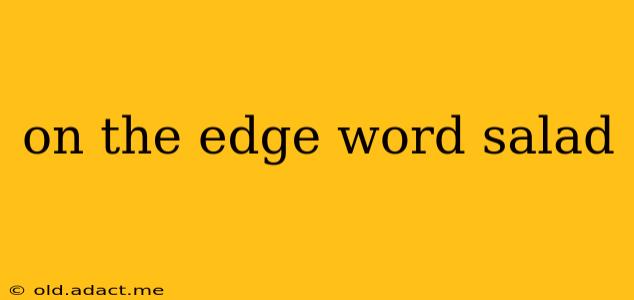On the Edge: Deconstructing the Phenomenon of "Word Salad"
"Word salad" is a term often tossed around, but what exactly does it mean? It's more than just a quirky phrase; understanding its nuances is crucial for appreciating its implications in various fields, from linguistics and psychology to creative writing and even social media. This exploration delves into the depths of "word salad," examining its origins, characteristics, and impact across different contexts.
What is Word Salad?
At its core, "word salad" refers to a collection of words that, while grammatically correct, lack coherent meaning or logical structure. It's a jumble of phrases and sentences that don't connect, creating a disjointed and nonsensical whole. Think of it as a linguistic equivalent of a tossed salad without a dressing – all the ingredients are there, but they haven't been combined in a way that makes sense. The experience for the listener or reader is one of confusion and frustration.
What Causes Word Salad?
Understanding the origins of word salad requires exploring its potential causes. This is particularly crucial in clinical contexts.
H2: Is Word Salad a Symptom of a Mental Health Condition?
Yes, word salad can be a symptom of certain mental health conditions, most notably schizophrenia and other thought disorders. In these cases, the incoherent speech reflects underlying cognitive impairments affecting thought processing and organization. It's not simply a matter of poor communication skills; rather, it’s a manifestation of a deeper neurological or cognitive issue. The person experiencing this may genuinely struggle to connect their thoughts in a logical manner.
H2: Can Word Salad Be Intentional?
Interestingly, word salad isn't always unintentional. In creative writing and certain avant-garde artistic expressions, it can be used deliberately to create a specific effect. Think of experimental poetry or stream-of-consciousness narratives where the jarring juxtaposition of words and phrases aims to reflect a fragmented mind or chaotic reality. This intentional use differs drastically from the word salad experienced by individuals with mental health conditions.
H2: What Are the Differences Between Word Salad and Other Speech Disorders?
Word salad is often confused with other speech disorders, but key distinctions exist. For example, while both word salad and jargonaphasia involve unusual language, jargonaphasia involves the use of made-up words or neologisms, while word salad uses real words in illogical combinations. Similarly, while both word salad and pressured speech involve rapid speech, pressured speech usually maintains a coherent theme, unlike the disordered nature of word salad.
Word Salad in Different Contexts:
The implications of "word salad" vary depending on the context in which it appears.
H2: Word Salad in Literature and Art:
As mentioned earlier, some writers and artists intentionally utilize word salad to evoke a specific emotional or intellectual response. It can symbolize chaos, mental breakdown, or the breakdown of societal norms. It challenges traditional notions of linguistic structure and meaning.
H2: Word Salad in Social Media:
The fast-paced nature of social media can sometimes lead to communication that resembles word salad. Rapid-fire posts, slang, abbreviations, and emojis can create a stream of text that lacks coherence when viewed as a whole. While not a clinical example, this demonstrates how the concept can manifest in everyday communication.
Conclusion:
"Word salad" is a fascinating linguistic phenomenon with implications that extend far beyond its literal definition. Understanding its potential causes and various manifestations, from unintentional symptoms to deliberate artistic choices, allows us to appreciate its complexity and significance across multiple disciplines. Further research into the neurological underpinnings and artistic applications of word salad promises to unveil even more about its multifaceted nature.
